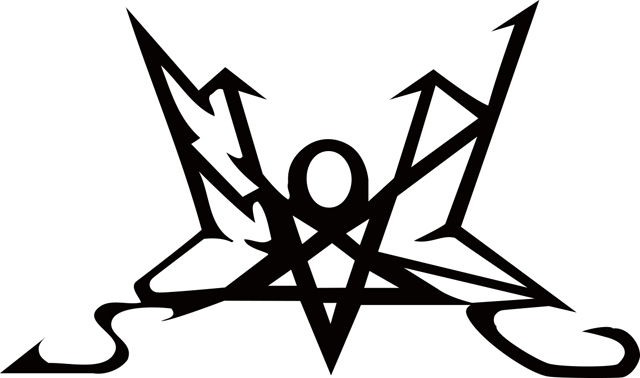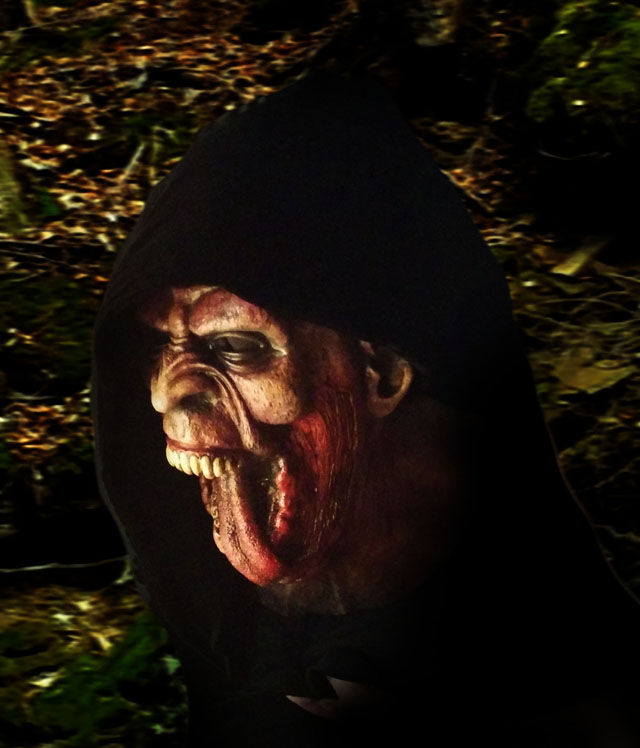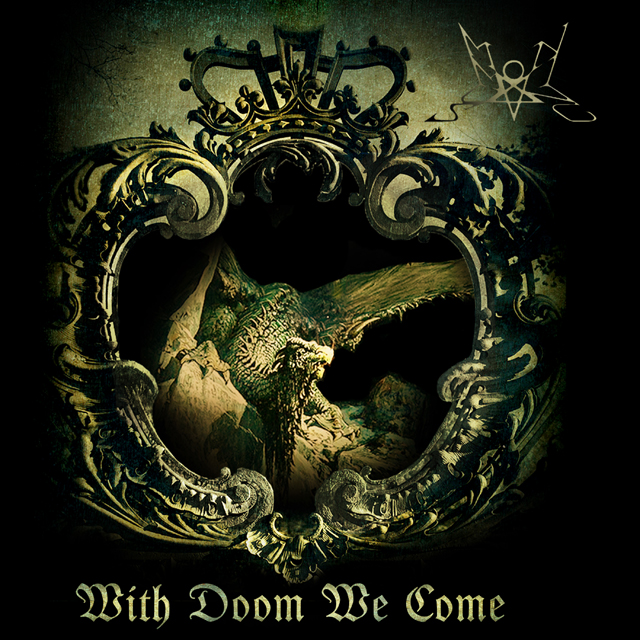
We recently conducted a survey to discover where extreme metal musicians liked to go on holiday. We found that those of a death metal persuasion favoured places such as Innsmouth and Dunwich; unfortunately many are never seen again. As far as your average black-packer is concerned a trip through the portal to Middle-Earth seems the place to head for a bit of cold frosty fun and they all come back with plenty of great tales to tell. Although there may just be one ring to rule them all it is Protector and Silenius, the Austrian duo behind Summoning who are best versed at turning their travelling tales into musical format. Following a five year voyage since ‘Old Mornings Dawn’ they are back and it’s with Doom they come. The following detailed interview turned out every bit as epic as one would expect from Summoning; read on….
AN: It’s been 5 years since last album Old Mornings Dawn, which seems like a normal sort of gap for you release wise. I take it that you work at your own speed and painstakingly make sure everything is right, you probably don’t have anything in the way of record label pressure to contend with and they leave you to your own devices. What has been going on with the two of you during this time?
Protector: We both have full-time jobs, we don’t pay our rent with music but by working regular jobs not connected to music. This explains the long intervals between our albums. But like always we have some special reasons for the time we needed. This time I was quite fast getting started with the new songs. Only a few months after the last release I worked on the remaining song fragments and was quite happy with the result. I already started to mix the new songs the way I thought they should sound and presented them to Silenius. That’s our regular way of creating songs. Normally I mix the songs as I like them and then call Silenius to give some feedback and change some details according to his opinion. But this time it was different. He did not criticise details, he criticised the songs in their entirety. It was not about changing details, but about totally remixing and restructuring most of the songs. What followed next was a long time of total stagnation and frustration. Silenius gave me orders about how the songs should sound, but I didn’t have the slightest idea what problems he was having with the songs I had mixed. This terrible, boring period lasted more than 2 years, till I finally told him that I am no longer in the mood to be in a band where all spontaneous atmosphere has gone, and making music is rather like going to a job and not about fulfilling personal passion. This lead to some discussions and to the conclusion that we simply must bring the album to an end, without turning around every small detail a thousand times. Finally, that crisis was over, and we could agree with everything, but those boring 2 years were a lost time for Summoning in my opinion.

AN: Have you a set way of working on things? I believe you are both based in Vienna so do you collaborate in a physical sense and get together regularly to flesh out ideas rather than doing things via file swapping etc?
Protector: Yes, we both live in Vienna and going to Silenius’ apartment takes me about 15 minutes – the same time it takes Silenius to go from work directly to my studio – so there is no need to transfer any files via the internet. Normally each song starts with Silenius visiting my studio with an idea of a melody in mind, which I record as a midi file. Even if we can meet physically, we don’t do any kind of rehearsals as is normal for any metal or rock band. When one of us has an idea, we add another melody to it. Our songs don’t grow when we are together, but rather when we are alone in our rooms listening to the melodies of the others. This was always like that since “Stronghold” and it will be surely be like that in the future.
AN: I guess with technology ever evolving, the way you work has changed over the years. Does it make things easier for you or allow you to experiment more and do things that you were never able to in the past?
Protector: Yes, it makes things much easier and I don’t miss the old times, when we had to record our songs in studios controlled by some external guy, at all. Even if in Summoning we sing about ancient times, kings etc. I am not a nostalgic person at all. I appreciate the advance of technology very much and think that today’s software and music computers are really a great benefit for musicians. I really am very satisfied that today it’s possible to mix a sound with just a normal computer, that does the same job that a huge room full of devices did in the past. Even if Summoning today is not really considered as a total underground band (especially not by many hardcore, true black metal fans), the idea of being underground is still very much alive. We don’t want to be dependent on huge budgets. We don’t want to have financial pressure from any label telling us what to do. We want to have everything 100% in our control, and modern technology is one of the essential elements which enables us to do this.
AN: Tell us a bit about the recording process of the new album?
Protector: As I said before, each song started with an idea of Silenius, while I added additional melodies to it (like some horns etc), and of course created some new rhythms on the keyboard as well. After we composed everything, I started to think about some cool guitar riffs to add which I composed on the keyboard, because playing on keys gives me more ideas than playing on strings. After that was complete we started thinking about the vocals, and Silenius spent a couple of weeks searching for lyrics which we could use. After he found the proper lyrics we sung them and then considered the songs to be finished. The mixing process then started, a process that can take a while as I already told you.

AN: What comes first, the music or the lyrics and the ideas and themes behind it all?
Protector: Always the music, never the lyrics. The lyrics are the very last thing Silenius deals with during an album production. When we start a song, we don’t have the slightest idea of any story or name that could be associated with the song. Only when everything is finished does Silenius start to search for poems that we could use, but I am never involved in that process. I just take the poems he chooses for the album and try to integrate them with my vocal lines. During the whole time we don’t even know the final names for our songs and just use some temporary working titles. To be honest, right now I still have those working titles in my mind when I think about the songs and not the official ones. It will take some time to change that.
AN: In my opinion there are two authors whose voices are quite prolific in extreme music and metal / black metal in general and these are H.P. Lovecraft and J.R.R. Tolkien. I think it’s fair to say that Summoning would be the first name on everyone’s tongue when it comes to the latter and you have narratively summoned the spirit of Middle Earth since right back to your early days. What is it that drew you to this realm in the first place?
Silenius: Yes you are right, and you also can easily divide it: death metal bands use H.P. Lovecraft lyrics and black metal bands Tolkien. I think the lyrics of Tolkien partly came up even during the time of the demo tapes and of course in our first cd “Lugburz”. But the difference is that in those times the Tolkien influence was just one of many influences. There were still satanic and occult topics alongside it. In those times some lyrics were also written by Pazuzu who helped us in this way. The conscious decision to build up a combined musical and lyrical concept around the Middle Earth concept started with the work for Minas Morgul and the driving motivation for this was both the departure of our drummer “Trifixion”, and we wanted to separate Summoning more from Abigor in terms of lyrics and musical presentation. The first step was that in reaction to the fast and hectic drumming of Trifixion we decided not to search for a new drummer, but make the drum rhythms on the keyboards. In the beginning we made them the complete opposite to his drum style – slow, heavy, bombastic and not rocking. From then on the songs were composed on keyboards which made them feel more epic and bombastic, so I searched for a new concept to make a coherent combination with the music and to get away from the strong satanic concept Abigor had. In that time Abigor still was the more popular band and I did not want Summoning to be just a kind of little brother to them. So, with the release of Minas Morgul, a completely new identity of Summoning was shaped, and this was the birth of our sound for the decades to follow…
AN: Is Tolkien an inspiration that is completely integral to the work of Summoning? I guess it is something that fans would expect and you are certainly scholars of his work, could you imagine a Summoning without his influence and have you ever considered deviating from the subject?
Silenius: I don’t think that summoning can exist without the Tolkien concept. It all began with the huge inspiration I drew from his books in the early 90s and I had a clear concept of how the music should sound to make a kind of musical painting of different locations or events within this world. I think the key is that the music should not only sound epic and bombastic, but I think the feeling of wanderlust and this special kind of wistfulness are very important to integrate in our music. These are feelings I strongly remember from when I read Lord of the Rings and the Hobbit. At times, when Dol Guldur was released we had a band discussion to make a different lyrical concept: we thought about making a concept album about the Nibelungenlied, but in the end, we gave up this idea and continued what we began. Meanwhile I also think not only about any individual Summoning album, but one day when we have finished with Summoning, I want to see it as a complete work that fits together.

AN: Where else do you take inspiration from, music, film, other literature, environment? I guess what is going on in the real world has little place within your musical cosmos?
Silenius: I don’t need too much external inspiration, from either other bands or other books. I am experienced and routined enough to get on my keyboard and get in the mood to compose. Maybe the only inspiration I still don’t want to miss is making long running tours through the forest or mountains near my hometown. That is something relaxing to get my head free and to think over in which direction Summoning as a whole, or special song which I am working on shall go.
AN: I think it’s fair to say that a lot of music within the more symphonic and blackened side of things takes a lot of inspiration from and strikes as a natural development from the great classical composers of old. I certainly find this true with your work, would you agree and do you consider classical music influential at all?
Protector: When you listen to our orchestral keyboards is obvious that people think about classical composers – and there was a time when I was trying to get into classical music. But I think the similarities to this kind of music are rather superficial, it’s more the sound than the melodies and specifically the song structures. Classical music does not contain anything like riffs. This music does not work with repeating and rhythmical patterns, while Summoning plays the same melody over and over again, while adding additional melodies during the development of a song. Adding so many melodies is also nothing that’s typical classical – I would say that since the times of baroque, different melodies at the same time don’t exist in the intensity as Summoning does it.
AN: I bet you listen to all sorts of music yourself, pressing play on the opening track again (and I have listened to the album a lot) I hear everything from classical, to world music, ambient and beyond. Metal per-se is not even the overriding factor.
Protector: It is true that we have different influences – and despite what I told in my last answer, classical music is surely one element of it. Because you mentioned “world music” – I think I have never ever listened to any music that was defined as world music. However I am fascinated with Arabic, Persian, Turkish rhythms and atmospheres, which have an influence on our music. One of the few “real” instruments you can hear on Summoning is the Arabic/Turkish darbuka, which I play with my own fingers. And it’s also true that metal is not really the dominating factor. It takes a lot of time for me to get the right riffs for the songs. I don’t see the guitars as some kind of sound carpet, like I think that lots of bands do. When I play a guitar I want to bring something into it and not just add some fat sound. For example, I refuse to play power-chords as this is too simple and an uninspired way to play guitar riffs.

AN: Do you think that such a diverse sound and the ever present narrative themes draw a larger cross section of people to you than might be expected?
Silenius: I don’t exactly understand the question, but I think you mean that Summoning attracts a lot of people outside the metal audience. I think that’s a very important point – people often cannot really tell why Summoning sound different compared to other bands, and I think a very important, or let’s say the most important reason is, that we do not compose like rock composers like the rest do. And after all metal music is just rock music: the drummer is playing fill-ins; the bass player puts groove to the music and the guitar player plays solos to present himself as a musician. All this is the essence of rock music and all this is what Summoning is not. On the one hand this is the reason we always had been misunderstood by parts of the metal scene, but the on the other this has helped us to get a fan base outside of the so called true metal elite.
AN: Ok, I have read the books and loved them at a younger age (I really should revisit) and naturally seen the films but am no Tolkien geek. I would love a bit of insight into the narrative and stories within the new album. I have visions in my head whilst it is playing but would love them fleshed out. Tar Calion I believe is a name adopted by Ar-Pharazôn a king who fought with Sauron, Carcharoth is a giant wolf, the first werewolf even and Herumor a dark lord. Are they all part of the same story and does the album tie things together or are they more individual tracks about different things within Middle Earth?
Silenius: First I must state that the new album is not a concept album, which means that each song has its own little stories to tell. Originally there was a plan that the first two songs tell one story, namely that of Ar-Pharazôn and his war against the Valar, but then I realized that the proposed lyrics for the second song did not fit the music in terms of structure and rhythm and so the song got a different topic.
Tar Calion is another name for Ar-Pharazôn as you mentioned. He was the last king of the Numenor who, blended by Sauron, built a great fleet, and sailed against the land of the Valar. The second song Silvertine speaks from this mountain, where once Gandalf fought his final battle against the Balrog. Carcharoth was the greatest and most powerful wolf in the service of Morgoth and he guarded the gates of Angband. He bit of the hand of Beren with the Silmaril within and became crazed with pain. The next song Herumor is about a less known character. He was a black Numenor who rose to power among the Haradrim and served Sauron in the end. The subsequent instrumental refers to a serial of low hills east of the shire. During the second and third age the hills were haunted by the barrow-weights sent by the witch king, so no man could settle there. Night Fell Behind is about self-sacrifice and heroism, while Mirklands draw the listener into a shadow land where the land of the living collides with the land of the dead. The final title song is from a time of the first age, when Morgon set foot on middle earth and built up his empire.
AN: How does the album title ‘With Doom I Come’ fit in with things? I have to say that in contrast the track itself is not doom-laden in the slightest and is if anything really quite jolly and triumphant?
Silenius: Usually when the working process for the music has finished I start to search for fitting lyrics and I also look out for good sounding words and phrases which could fit to song titles and even the album title. I made a lot of notes during the weeks of searching, and in the end I had around 50 words and phrases, and around 20 poems to choose from. For a long time, the album was supposed to have the title “Conquest” but I was not really satisfied with this title because it reminded me too much of this Columbus movie and the song from Vangelis. I found the phrase “With Doom I Come” when I reread a poem of Tolkien. It was the song from the Ents marching against Isengard. I liked the phrase and used it as a song title for the last song. I think it also fits quite well with Morgoth taking his steps to Middle Earth and so everything was done.
AN: There’s a wealth of instruments and sounds throughout the album and you are both multi-instrumentalists. There’s everything from horns to harps and of course there are some large choral parts, are these done via keyboards, played on the instruments themselves? I guess you are not ones for having guest musicians and do everything yourselves?
Protector: Apart from the aforementioned oriental percussion which I play with my own fingers and the guitars, there are no “real” instruments on the album. I have a large orchestral sample library which we use for our songs. I think that since the modern sample libraries are so advanced a real orchestra would not change much about the final sound. Real instruments are necessary if you put the instrument in the front and listen to the personal interpretations of the musician, but not if the orchestra is just used as a musical background of the songs. As mentioned before: the lack of real musicians is not some kind of shortage in our music, but a kind of total freedom and – more than anything – authenticity for us. The idea of hiring some external professional musicians to just play our melodies because it is their job, is horrible for me. All of the bands who did that in the past (except “Deep Purple”, who did it excellently decades ago) just lost a lot of credibility for me.

AN: I can completely understand why you don’t play live. This is beyond the sound that could really be interpreted without a big stage production behind it which is hardly practical. Is that the main reason why you wouldn’t consider it and do you still regularly find festival promoters etc trying to coerce you?
Protector: That reason is a very important one, but there is another that is even more important. We simply consider ourselves composers and not musicians. This means that the peak of any album is the moment when we get a new melody or rhythm, not when we take our instruments in our hands. Creating songs is the essential thing, not reproducing them. I remember times long ago, when I was reading metal magazines with interviews asking the band members which musician they imitated in front of the mirror when they were teenagers. Each time I read that question I was very surprised why people feel the need to imitate the physical moves of a person whose music they like – because for me only the music counted, never any performance. So it was clear from the beginning that presenting myself as a person with my body was never important for me. I think people who don’t have this passion can never be good live musicians. Making music for me is something very introverted, while playing on stage is something extremely extroverted. We both are rather introverted – so definitely not good live musicians.
AN: What else are you currently involved with at the moment, it’s been a while since the last Ice Ages album from Protector although Amestigon’s Thier featuring Silenius certainly got some good reviews and attention a couple of years ago?
Silenius: Yes, I am quite active beside Summoning at the moment. Last week I added new vocals to an Amestigon song which will be released together with another one on a 10-inch split vinyl with another band. I forgot the name now, but I think it will be named on their homepages. And I did the vocals for the latest Abigor release which also will be released in the beginning of the next year together with the 7-inch single that will come some weeks before the album. I really want to make another release for Kreuzweg Ost, but at the moment I have no time for it, but hopefully I will do so in the next years.
AN: Any ideas for the future and Summoning? I guess we should be patient whilst you pop back through that portal into Middle Earth?
Silenius: Of course it will take a long time now until a complete new album will be released, but what we want to do is make a small, maybe 3 song release that will be only see the light of day over a 10-inch vinyl and just limited on a few hundred copies. I think it is time to make a release not for the many people, but also for the few.
AN: Anything else you would like to add?
No, I think that’s all for the moment. Of course, as ever many thanks to you and other fans from Britain.
Great that you like our music and thanks for the compliments. Till next time…
Interview: Pete Woods
https://www.facebook.com/SummoningOfficial
https://summoning.bandcamp.com

Leave a Reply